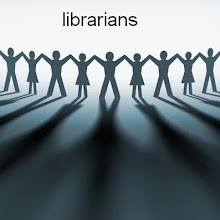Librarians Unite!
When a library association ceases to represent the interests of its 'community' - What does one do?
The 8 R's, of course:
Reevaluate
Recontextualize
Remind
Reinvigorate
Represent
Reorganize
Revive
Reassemble
Here are a few excerpts from the recent discussion on the relevancy of the Canadian Library Association.
The 8 R's, of course:
Reevaluate
Recontextualize
Remind
Reinvigorate
Represent
Reorganize
Revive
Reassemble
Here are a few excerpts from the recent discussion on the relevancy of the Canadian Library Association.
The Canadian Library Association (CLA), which represents Canadian libraries and library workers who are members, sees itself as the “advocate” and “public voice” for “Canadian library and information community.”1 The association has a simple, straightforward2 “Code of Ethics” that outline the responsibilities of the CLA and its members. It is necessary for an association, especially one with members from disparate places and backgrounds, to have a clear code of ethics and responsibilities because it shows its members what the association stands for and what its role is. It is also necessary and expected that an association will follow through with their code of ethics by acting in according with them and advocating for causes that are in line with their ethics and mission. We should expect that an organization that represents Canadian libraries and library workers also takes these ethical principles and translates them into actions. However, recent issues, such as the cuts to the Toronto Public Library System, the librarian and archivist strike at UWO, and the altering of the mandate of Libraries and Archives Canada, show that the CLA chooses not to advocate and be the voice of the library community, but instead remains silent or attempts to be neutral.
“What exactly would it take for the CLA to take a stance and defend libraries?” The only recent statement that they have on their website that condemns an action20 is on the destruction of the People’s Library at Occupy Wallstreet in New York City.21 This suggests that in order to provoke the CLA, one must deliberately physically destroy a library; from the Toronto example “destroying” a library through cuts and branch closures is not enough to justify a statement.
By looking at these three issues, it is clear that the CLA is unable or unwilling to put its Code of Ethics into practice. Meanwhile, the CAUT and other unions are not just strong voices in support for librarians and library workers, but also libraries as a whole. Based on this, there is no point in trying to improve the CLA’s Code of Ethics or attempt to make the CLA follow these statements: the CLA has shown that it is not interested in representing librarians through its inaction and complicity on issues that its Code of Ethics indicate it should be actively promoting and defending. This may seem like a harsh judgement, but the CLA has no excuse: how can we not judge it for not upholding its own values? Why should we continue to support an association that does not support us? Instead of trying to overhaul the CLA, librarians interested in protecting and promoting the profession should spend their time and energy within the organizations that are already doing this work: their unions. CAUT and TPLWU have both shown that they will come up to bat on library issues and that they are capable of translating their support for librarians into real activism.
The problem with this situation is that it leaves librarians without a unified, national voice. This is why I call on librarians around the country to create a national professional organization that can be a real voice for librarians and the profession and take on the critical issues that the CLA has decided are not within its mandate.


0 Comments:
Post a Comment
<< Home